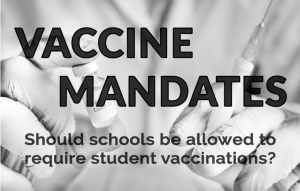PRO: Unfaltering infection rates
November 3, 2021
After nearly two years of quarantines, impromptu shutdowns and social distancing, it’s safe to say that everyone is aware of how quickly a disease can spread without proper protective measures.
And yet, according to news sources like Reuters and npr.org, a little over half the country is fully protected against COVID-19, despite the fact that it has infected almost 45 million people in the United States alone.
It is due to these unfaltering infection rates that vaccine mandates have been passed at both the federal and state levels, as they are necessary measures to halt the spread of the virus and hasten a return to normalcy.
California Gov. Gavin Newsom’s vaccine mandate for educational staff and schoolchildren is especially important, as high school students have little regard for matters such as public sanitation. Masks and social distancing alone are not nearly enough to curb the spread of a virus in places as unclean and as large as public schools like DBHS, where it is not uncommon to find students spitting in the planters or leaving their trash untouched in the lunch areas
Therefore, vaccines are a necessary and effective line of defense to use, not to mention, one that has been proven time and time again to combat the negative effects of disease. In fact, schools across the country already require students to be vaccinated for diseases like polio; the COVID-19 vaccine would just be another shot to add to the list. Of course, those who are immunocompromised or otherwise incapable of being vaccinated should be exempt from such a mandate.
However, those who can get vaccinated should, especially since studies have shown that vaccination minimizes chances of contracting the virus and lessens the severity of the symptoms should a person actually become infected. This is all the more reason that those who can, should get the vaccine, so that they can create safer environments for those who cannot protect themselves.
Considering the virus can be incubated for up to fourteen days on average, it is difficult to tell when one is COVID-positive and thus may be at risk of unknowingly contaminating their surroundings. At schools, up to hundreds of students use the same classrooms and facilities every day, making consistent sanitation virtually impossible, and thus drastically increasing possibilities of infection from contaminated objects.
Mandated vaccinations would also help ease parents’ worries about their child’s safety, and staff members’ concerns about endangering high-risk family members. They would also eliminate practices responsible for the build-up of COVID-19 fatigue, like remote learning and working from home, in schools and workplaces, so long as everyone is vaccinated.
After all, unless members of the community are constantly being tested for COVID-19, there is no telling whether or not there are positive cases within the vicinity, putting more people at risk.
When students are not taking enough initiative to protect their own public health and safety, it is up to the government to make decisions on behalf of their general welfare. Thus, vaccine mandates are reasonable measures of prevention and containment for the novel coronavirus.









